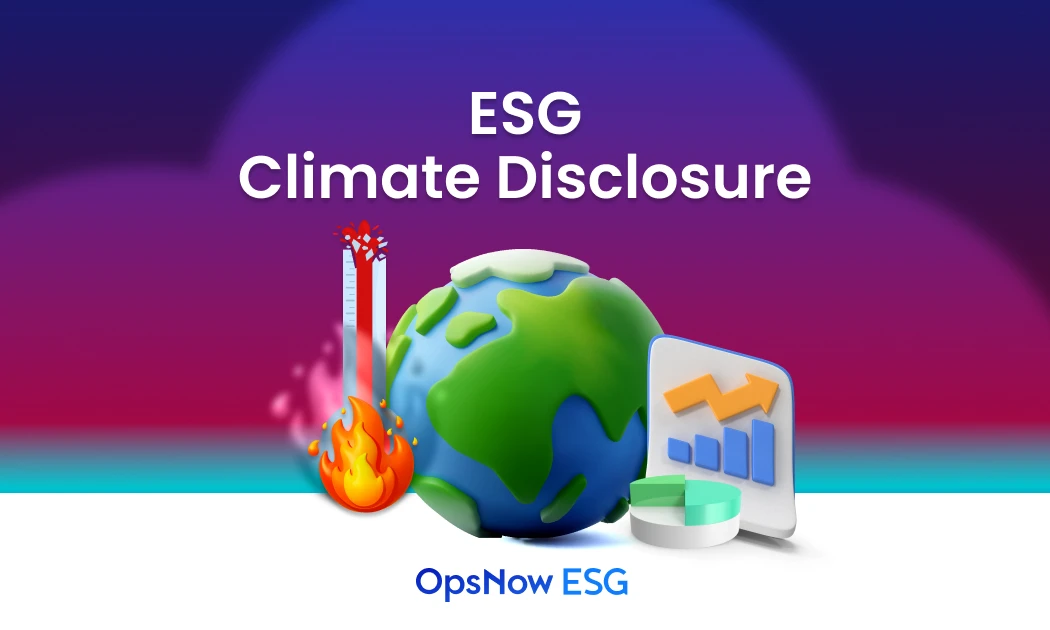
You Need to Prepare for Climate Disclosure Now

With ESG emerging as a major topic, companies are striving for sustainable management and growth. ESG stands for Environment, Social, and Governance, which are important values for a company's long-term survival and growth. In particular, responding to climate change is drawing attention as a key risk factor, and companies must provide investors and stakeholders with information about climate-related risks and opportunities. To make this more accurate and reliable, various disclosure systems are being established both domestically and internationally.
1. Local and Global Climate Disclosure Regulations
1.1 U.S. SEC Climate Disclosure
The U.S. Securities and Exchange Commission (SEC) finalized the mandatory climate disclosure rule in March 2023. Starting in 2026, SEC climate disclosure will be implemented in phases for all listed companies, with large enterprises with a market capitalization of $700 million or more being the first subject to the rule.
The disclosure items include climate risk management (governance, targets, strategy, process), greenhouse gas emissions and calculation methods, and climate-related financial impacts (extreme weather events, natural disasters), and are applied differentially depending on company size. Due to opposition from industry, mandatory greenhouse gas disclosure is limited to Scope 1 and 2, while Scope 3 is excluded.
1.2 EU CSRD (Corporate Sustainability Reporting Directive)
The EU announced the CSRD in April 2021, making disclosure mandatory from 2025 for companies within the EU as well as certain non-EU companies that meet specific requirements. Therefore, even domestic companies will be subject to disclosure if they own large enterprises or listed SMEs within the EU.
The CSRD is divided into the First set (general and ESG topic-specific standards) and the Second set (non-EU companies, listed mid-sized companies, and sector-specific standards), and reporting is conducted in accordance with the ESRS*, the European Sustainability Reporting Standards. In particular, the CSRD fundamentally requires a double materiality assessment, which evaluates the mutual impact between a company’s financial performance and sustainability activities.
*ESRS: A detailed standard for implementing European sustainability reporting, providing guidance on how disclosure information should be prepared.
1.3 International Financial Reporting Standards (IFRS) Foundation's ISSB S1, S2 (International Sustainability Standards Board Disclosure Standards)
The International Sustainability Standards Board (ISSB), under the International Financial Reporting Standards (IFRS) Foundation, has announced the sustainability disclosure standards S1 (General Requirements) and S2 (Climate-related Disclosures). S2 is based on the four core pillars of the TCFD* (Governance, Strategy, Risk Management, and Metrics and Targets) and must be disclosed as part of the annual report that includes the financial statements. Additional topics such as biodiversity, ecosystems, and human rights are planned for future expansion.
*TCFD: A global organization that develops information disclosure frameworks to help companies and financial institutions better report on climate-related financial risks. The TCFD recommendations present four thematic areas for effective information disclosure.
1.4 South Korea's KSSB (Korea Sustainability Standards Board)
South Korea is preparing for mandatory ESG disclosure by establishing the KSSB. The KSSB standards are based on IFRS S1 and S2 and consist of KSSB Standard No. 1 (General Requirements), No. 2 (Climate-related Disclosures), and No. 101 (Additional Disclosures). They are designed to align with international standards from the EU and the US while also considering corporate adoptability.
For example, the standards allow for the provision of qualitative information when quantitative data is difficult to obtain for disclosing climate risks and opportunities. They also allow companies to choose whether to disclose industry-specific metrics or their internal carbon price*.
*Internal Carbon Price: A policy introduced by companies to assign a virtual price to their own carbon emissions, which can then be factored into investment or decision-making processes.
2. Climate Disclosure Preparation Process
- Data Collection: Accurate emissions data must be collected from across the company's entire value chain, and the necessary infrastructure to support this must be established.
- Emissions Calculation: Emissions should be calculated by securing emission factors for each product, and the methodology used must be transparently disclosed.
- Verification of Calculation Results: The calculated results must be verified to ensure they comply with emission calculation and disclosure standards, and that the methodology and data used in the calculation were appropriate.
- Preparation of Emissions Disclosure Report: Based on the calculation results, a report that meets regulatory requirements must be prepared and submitted.
- Risk Management and Strategy Development: The current status of emission reductions must be reviewed, targets must be set, and strategies must be adjusted by monitoring regulatory changes.
- Execution of Reduction Process: Specific reduction activities must be implemented and their performance managed.
3. Solution: OpsNow ESG
You can directly input data for calculating carbon emissions, and energy usage data is automatically entered through API integration with utility providers like KEPCO and city gas companies.
- Carbon Emission Data Consolidation & Automated Data Collection via API Integration
Data for calculating carbon emissions can be entered directly, and energy usage data is inputted through API integration with utility providers like KEPCO and city gas companies.
- Scope 1 & 2 Emissions Calculation
It calculates carbon emissions by securing domestic and international emission factors and provides the methodology transparently. You can view and compare monthly/past carbon emissions at the corporate and business-site levels.
- Emissions Calculation Verification
A verification certificate for carbon emission calculations is provided through the verification services of the Korea Quality Foundation, a domestic verification body.
- ESG Operation & Calculation Report Preparation
We support the preparation of ESG operation and calculation reports through consultation.
- Competitor Emissions Management Benchmarking & Reduction Target Consulting
We provide OpsNow ESG's unique benchmarking service, which allows you to compare your company's carbon emissions with those of similar-sized companies in the same industry. Through consulting, we support the establishment of carbon neutrality and reduction targets.
- Support for Carbon Credit Purchasing Linkage
With a single button, you can navigate to the carbon credit market and purchase carbon credits from global certification bodies like Verra and Gold Standard to reduce carbon emissions.
Climate disclosure is no longer a distant future. The expectations of investors and consumers are also rising, making ESG management a necessity, not a choice, for corporations.
From data collection to report generation and reduction activities, OpsNow ESG supports the entire process, helping companies implement reliable climate disclosures and move forward as environmentally friendly enterprises.
Prepare for a sustainable future with OpsNow ESG!




